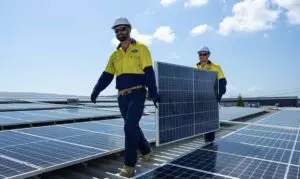The G20 summit has come and gone and although the need for “tangible actions” was a great headline, when I read through the final official communique from the event, I couldn’t help but feel disappointed.
Now of course, the G20 has a big agenda and covers many, many things but when you look at the key release from yesterday, yet again it highlights one of the G20′s key aims which relates to energy and the issues we face in transitioning our industry.
If you dig through the releases and references on energy and subsidies, the G20 release and indeed its own web site leads you to a fascinating document titled “AUSTRALIA: INVENTORY OF ESTIMATED BUDGETARY SUPPORT AND TAX EXPENDITURES FOR FOSSIL-FUELS“.
This document outlines exactly what Australia’s subsidies to the fossil fuel sector are and is based on information provided by Treasury.
In September 2009, G20 Leaders committed to “rationalise and phase out over the medium term inefficient fossil fuel subsidies that encourage wasteful consumption”. G20 Leaders requested that the OECD, the IEA, the World Bank, and OPEC analyse the scope of energy subsidies and provide suggestions for the implementation.
The OECD’s work in this area aims to support countries in developing and implementing successful subsidy reform or phase-out plans. In 2013 the OECD released an update of the Inventory of Estimated Budgetary Support and Tax Expenditures Relating to Fossil Fuels (pdf) covering all 34 OECD countries. At the same time, the OECD published a companion volume on Taxing Energy Use.
.Their words are specifically “In 2014 the G20 will support international efforts to improve the operation of global energy markets and increase cooperation between major producers and consumers. The G20 will also explore how it can advance work on energy efficiency and continue its work to improve the transparency of energy markets. These efforts will help position us to meet the energy demands of the future.” As part of this years G20 event, this report was updated in 2013 and the new report was presented.
There are three key issues that I find intriguing about this latest report and data set (which includes Australia’s level of subsidisation):
- Despite the call’s for transparency and the urging of the Honourable Joe Hockey for members to comply, Australia’s data only goes to 2011. One would think that we could do a bit better than data that is 3 years old. It is also interesting to note that the aim of this inventory is cited as “Reforming or eliminating inefficient support for the consumption or production of fossil fuels can contribute to achieving economic and fiscal objectives and helping to tackle environmental problems such as climate change. To further support reform efforts, OECD and IEA compile estimates of subsidies and other support measures for a large number of countries.”. Despite this the data provided shows that Australia’s support for fossil fuel subsidies INCREASED over the period by 18% of $1.27 Billion dollars. .
- Luckily however, I found a new analysis by Environment Victoria released earlier this year, which has looked at 2013 Treasury data and forecast it forward to 2016/2017. The result? Subsidies continue to grow and if we compare 2016 to 2005 subsidies to the fossil fuel sector are expected to have grown by 71.4%. Way to “rationalise and phase out subsidies”, Joe. Since Joe wasn’t able to get it together in time for the G20, we’ve compiled both sets of data together (below) so that he can flip it on to the other G20 members: “Dear guys, here’s that updated graph we ran out of time to finish, sorry we missed the deadline, luckily some well meaning members of local groups, industry associations and some annoying analyst finished it for us for free! Yet another example of how we are saving the country money. Kind regards, your mate Joe.”
- Thirdly, the next time the press, media, State Government, Federal Government or fossil fuel industry starts whining about a lack of subsidies and how unfair life is compared to renewables, send them a copy and a quick note with this research. You can give the credit to Joe and Treasury.
Source: Solar Business Services. Reproduced with permission.







